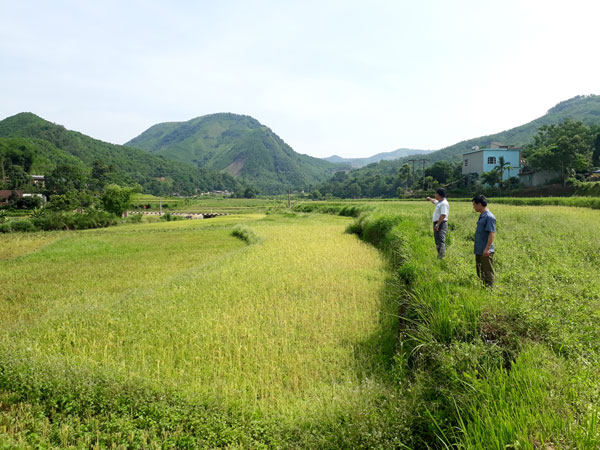
(HBO) – A slow change in the economic structure, along with difficulties in production due to natural disasters, droughts and abnormal fluctuations of the market, have challenged the process of poverty reduction in Lap Chieng commune, Kim Boi district, the northern mountainous province of Hoa Binh.
Lap Chieng has been
received assistance from the government through Programmes 135 which is
designed to help poor communes in ethnic minority-inhabited and mountainous
areas with socio-economic development. The commune is about 10 km from
the centre of Kim Boi district.
Lap Chieng commune comprises three villages,
Lap, Chieng and Khoay, with 438 households. Despite its favorable geographical
location, only 3km from Road 12B and having concreted inter-communal roads, the
transformation of Lap Chieng’s economic structure remains slow, failing to
match its potential. Therefore, the poverty rate in the commune in 2016 was
still high, at 44.8 percent, with the per capita income reaching only 14
million VND per year.
Small
rice fields and droughts have caused difficulties to production in Lap Chieng
commune (Kim Boi district). Photo taken in Chieng village.
By the end of 2016, Lap Chieng had fulfilled 12
criteria of new-style rural area building. Currently, along with the criteria
that require large investment resources, the commune finds it hard to achieve
the criteria in raising local people’s income. Local residents mostly rely on
agriculture without commercial products. The policy of "land mergence and field
exchange” has not been implemented because of a lack of consensus among local
farmers.
According to the Secretary of the commune’s
Party Committee, in 2016, when the price of pork increased sharply, many
households in Lap Chieng invested in expanding pig farms. Therefore, when the
price of pork slumped, local farmers fell into the situation of "double
loss." As a result, this year's target of increasing the per capita income
to 15 million VND per person per year is likely unreachable.
Among the three villages, Khoay village has the
poorest transport system, which hinders the locality to tap its potential in
forestry and bamboo shoot growing.
In Chieng village, fields are filled with different
colours these days. At the beginning of the village, some rice fields are ripe
and are ready for harvesting. Meanwhile, some other fields are still green and
mixed with weeds. Some maize fields are stunned because of exhausted land.
Bui Van Chien, head of Chieng village, said that
farming land in the village is divided into three areas, two of which often
suffer severely droughts. Some fields are left deserted because "there is
no water for farming."
In Dong Me area, many fields are quite large but
do not have enough water for rice cultivation, thus becoming cattle grazing
areas. Some other fields have been cultivated with rice but they have seen more
weeds than paddy. Chieng village has three water reservoirs but the water
volume is still not enough as the water reserve depends on rains.
The Secretary of the commune Party Committee
stressed the need to focus on communications to fulfil the plan of "field
mergence and field exchange”, creating favourable conditions for the
restructuring of the local economy. Alongside, it is important to find crops
and livestock which are suitable to the local conditions, he said, adding that
in the near future, the commune will focus on promoting forest plantation and
cultivation of safe and clean vegetables.
Viet Dao
Since the beginning of this year, under the direction of the Department of Agriculture and Environment, the Sub-Department of Agricultural, Forestry, and Fishery Product Quality Management has strengthened the integration of the professional activities to promote and guide the organizations and individuals in the production and trading of agricultural, forestry, and fishery products to comply with the legal regulations regarding the use of chemicals, pesticides and veterinary medicines in crop cultivation, livestock farming and aquaculture. They also provide guidance to processing and manufacturing establishments on keeping the records to trace the product origins and using food additives from the approved list according to the regulations.
Hoa Binh province saw a significant rise in state budget revenue in the first two months of 2025, heard a meeting chaired by Vice Chairman of the provincial People’s Committee Quach Tat Liem.
Ha Thi Ha Chi, a 26-year-old graduate in law, has taken an unconventional path by returning to her hometown in Mai Chau district to establish the Tong Dau Cooperative, creating stable jobs for local women and bringing Thai ethnic brocade weaving to the global market.
As the Lunar New Year 2025 approached, pork prices surged, creating a profitable season for farmers in Tan Vinh commune, Luong Son district. Taking advantage of the rising demand, Can Minh Son, a farmer from Coi hamlet, sold over 30 pigs at 69,000 VND/kg, each weighing more than 100 kg. After deducting expenses, his family earned a profit of over 50 million VND.
alternate member of the Central Party Committee, Secretary of the Hoa Binh provincial Party Committee Nguyen Phi Long on March 5 had a working session with Yan Jiehe, Founder and Chairman of the China Pacific Construction Group, one of China's largest private corporations in the field of transport infrastructure. Deputy Secretary of the provincial Party Committee, Chairman of the provincial People's Committee Bui Duc Hinh and leaders of provincial departments and sectors also attended the working session.
The electronic printed circuit board (PCB) manufacturing and processing plant of Japan’s Meiko Group, located at Da River Left Bank Industrial Park in Hoa Binh city with a total investment of over 200 million USD, is expected to create thousands of jobs and make a significant contribution to the local budget.



